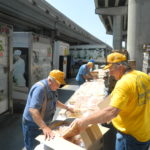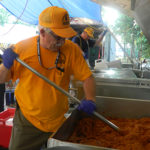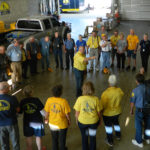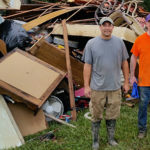John LaNoue began helping Texas Baptists meet human needs more than 40 year ago, and a list of firsts marks some of the highlights of his service.

John LaNoue recounts examples of the “activity of God” in Texas Baptist Men disaster relief ministries during the dedication of a new disaster relief complex at the TBM mission equipping center in east Dallas. (File Photos)
|
He was builder of the first mobile clinic along the Rio Grande. Designer of the first Baptist disaster relief mobile unit. Leader of one of the first American Christian teams to enter Iran since the Islamic Revolution. Member of one of the first groups from the United States in more than four decades to spend extended time in North Korea.
As far back as the late 1980s, friends told him he should write a book about his experiences. He retired from the Texas Baptist Men staff in 1999, fully intending to write. But he didn’t publish Walking with God in Broken Places until a few months ago.
“I hadn’t learned the lessons yet,” he said. “I could report on what happened and who did what. But God wouldn’t give me freedom to write it until I learned the lessons.”
Indeed, the book carries the subtitle, “…and lessons I’ve learned along the way.” In 535 pages, LaNoue explicitly cited more than 40 lessons he believes God taught him, and readers probably could draw an equal number of conclusions by reading between the lines.

John LaNoue built the first Baptist disaster relief mobile unit for Texas Baptists in 1972. Today, Texas Baptist Men operates a fleet of disaster response vehicles, and Southern Baptist Disaster Relief has grown to become the third-largest disaster response group in the United States.
|
“I tried to show how God uses ordinary people in extraordinary ways to accomplish the evidently impossible,” he said.
LaNoue grew up poor in Beaumont. His father was a hard-drinking boilermaker who left his family when his son was 4 years old. LaNoue’s life changed at age 16 when two laymen led him to faith in Christ.
Sign up for our weekly edition and get all our headlines in your inbox on Thursdays
Construction of the first mobile medical unit Texas Baptists used along the Rio Grande grew out of an insight LaNoue gained while preparing to teach a Bible class at Kilgore College, where he served as Baptist Student Union director. As he read John 14:12-15, he was struck by Jesus’ statement that his followers would continue the works he did and do even greater works.
As he began to consider what Jesus did in his ministry, he realized everything fit into two categories. “He met human need where he found it, and he introduced people to God,” LaNoue concluded.
With those two guideposts before him, he began planning for a student medical/dental mission trip to the Rio Grande. After visiting and praying with his personal physician, Kerfoot Walker of Tyler, LaNoue realized the most effective way to meet needs and share the gospel in multiple remote villages in a short time—bring an examining room on wheels to where the people lived.

John LaNoue spent three months in North Korea in 1997 as part of a small team of nongovernmental organization representatives who monitored the distribution of food provided by humanitarian organizations in the United States.
|
Early experiences working in an automotive repair shop, body shop, machine shops and a foundry served him well when he converted an old school bus into a mobile medical unit.
“God is definitely the great economist. He never wastes anything, not even youthful experiences,” LaNoue observed.
Those skills came in handy again just a few years later when he designed the first Baptist disaster relief mobile unit. Texas Baptists first became involved in disaster relief after Hurricane Beulah hit South Texas in 1967. Three years later, when Hurricane Celia struck, Texas Baptist Men took the lead in coordinating the disaster response, and on-the-job experience demonstrated the need for a mobile field kitchen.
Working around-the-clock 36 hours, LaNoue drew up the plans for a trailer that could house the field kitchen, a communications center, bunks for a crew and essential disaster response equipment.
With funds provided through the Mary Hill Davis Offering for Texas Missions, LaNoue and a crew of volunteers built the disaster relief mobile unit in the rear driveway of his home in Mesquite.

LaNoue helps distribute food in North Korea in 1997.
|
Just as the unit neared completion, the Guadalupe River in South Central Texas flooded, causing more than $17 million in property damage and drowning 17 people. LaNoue drove the mobile unit to Seguin and set up disaster relief operations on the courthouse square where he, his 9-year-old son and a few other TBM workers field-tested the unit.
“Sometimes obedience to the Father makes you look a lot better than you really are,” he reflected.
In the years that followed, LaNoue traveled with the mobile disaster relief unit to missions in Honduras and Mexico, as well as throughout Texas and around the United States. And he led disaster relief teams to dangerous places where few Americans have been welcomed—particularly Iran and North Korea.
“In Iran, we were able to see the effectiveness of an unspoken witness given through love and generosity,” he said, recalling the close supervision the Baptist disaster relief crews received from Muslim officials as they served Kurdish refugees in the Dolanov Valley.
LaNoue remembered the report a military official gave to a Mullah: “These men are not like the Americans we have heard about. They do not drink or smoke. I have watched them for three weeks, and they have not bothered any of the women. They sing in the night, and they love each other.”
In response, the Mullah anointed LaNoue’s hands with rose oil and prayed for Allah to bless the Baptist workers.
In 1997, LaNoue spent three months in North Korea as part of a five-person team of nongovernmental organization representatives who monitored the distribution of food provided by humanitarian organizations in the United States.
“In the lonesome hours of the night, God was teaching me to find comfort and companionship with him,” he said.
Working in disaster relief across denominational lines and in various cultures taught LaNoue lessons he believes he might never have grasped if not forced out of his Baptist comfort zone.
“The notion that people have to do things my way, sound like me and look like me—the Lord blew that out the window,” he said. “I’ve learned never to look down on other people’s walk with God. I have to respect other people’s experience with God and trust it to be valid and authentic, even though it’s not like mine.
“God is at work everywhere. I’ve grown outside my Baptist experience.”
In his own walk with God through broken places populated by hurting people, LaNoue noted he has seen miracles he never would have encountered had he not been placed in positions where God was his only resource.
“I can only do what God enables me to do,” LaNoue said. “Probably the most important lesson I’ve learned is that God is absolutely God. He can do anything he want to do with people who are willing to join him in what he wants to do.”
Walking with God in Broken Places is available from Amazon.com. For a personalized autographed copy, send $20 plus $5 for shipping and handling to John LaNoue, P.O. Box 396, Frost, TX 76641.















We seek to connect God’s story and God’s people around the world. To learn more about God’s story, click here.
Send comments and feedback to Eric Black, our editor. For comments to be published, please specify “letter to the editor.” Maximum length for publication is 300 words.